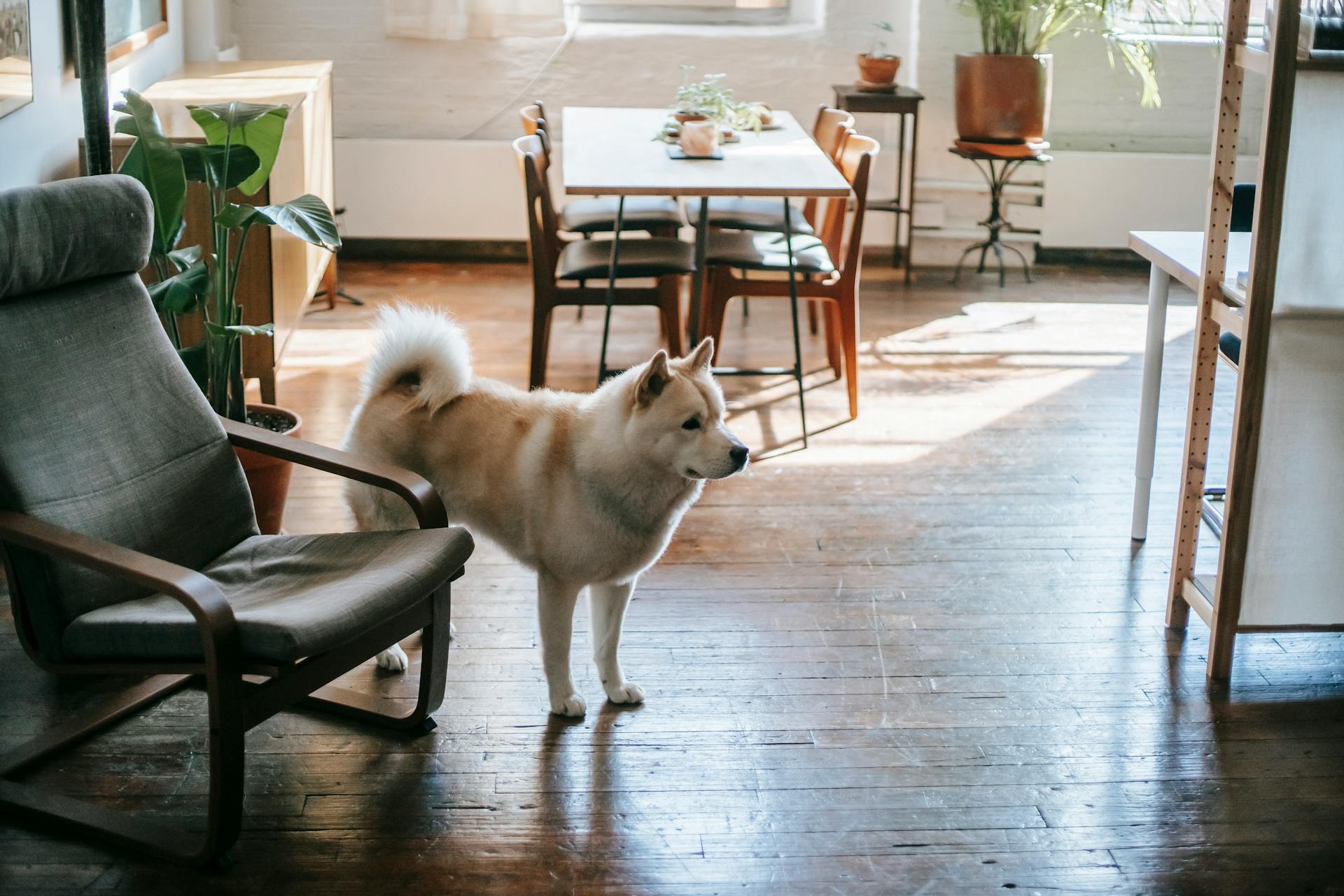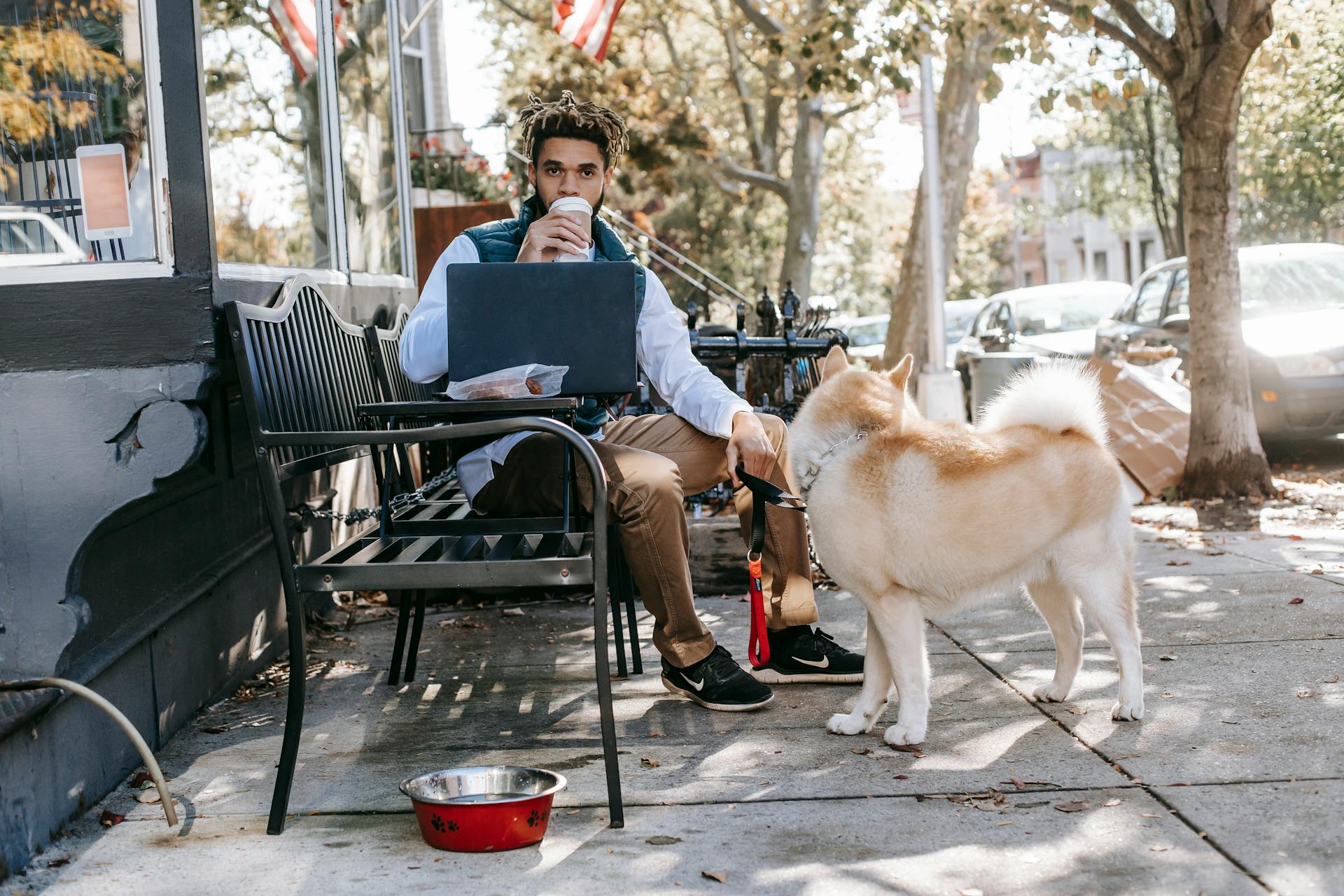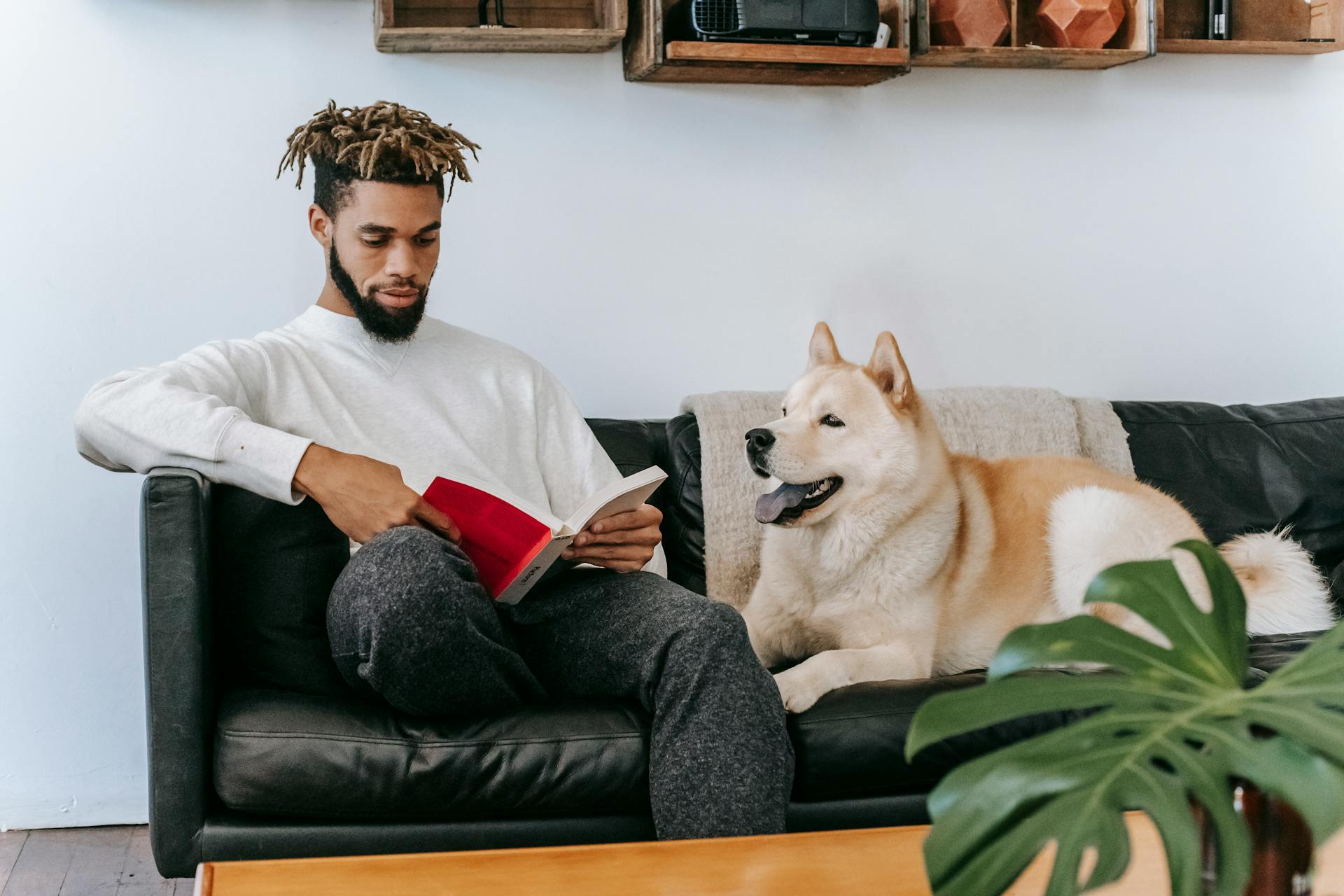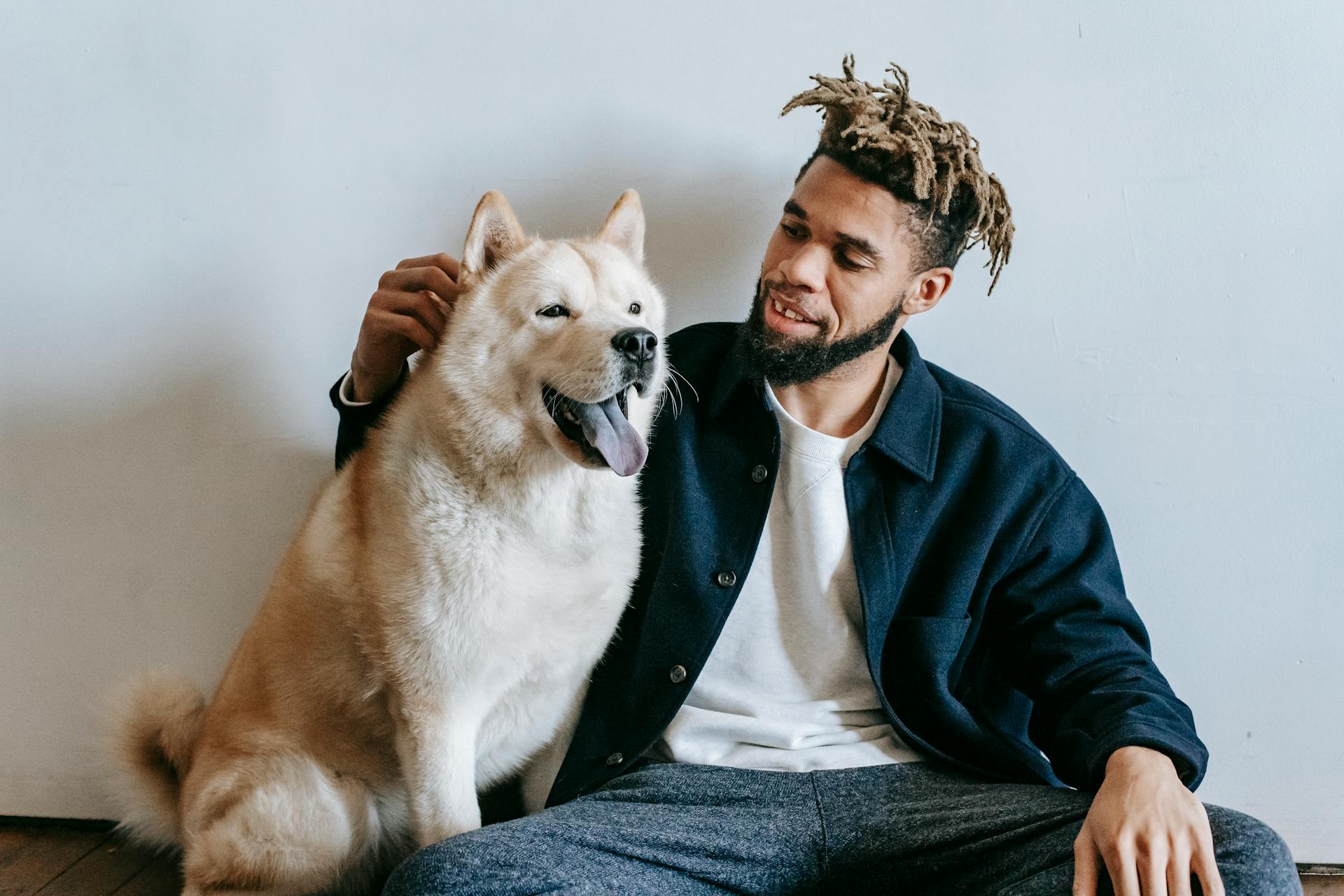
The Akita Inu is an ancient breed that originated in Japan, specifically in the Akita prefecture. They were originally bred to hunt large game such as deer and bear.
These dogs are known for their loyalty and protective nature, making them excellent family pets. They are often described as " Velcro dogs" due to their tendency to stick close to their family members.
Akitas are relatively large dogs, with males weighing up to 130 pounds and standing as tall as 28 inches at the shoulder. Their thick double coat requires regular grooming to prevent matting and tangling.
Their short lifespan of 10-13 years means that owners need to be prepared for a relatively short time with their Akita companion.
Worth a look: Shiba Inu Family
Health and Maintenance
The Akita Inu is a large breed that needs regular exercise to stay happy and healthy. They'll love joining you on outdoor activities like running or hiking, and they're actually more comfortable in cold weather than humans are.
To keep your Akita's coat under control, be prepared for regular shedding - it's not a hypoallergenic breed. You'll need to trim their nails about once a month, but bathing them is rarely necessary as they're naturally clean dogs.
Regular dental care and ear cleaning are also important to prevent issues like bad breath and infections. And don't forget to keep an eye on your Akita's eyes, as they're prone to eye problems.
Health Problems
As an Akita owner, it's essential to be aware of the potential health problems that can affect your furry friend. Hip dysplasia is a common condition that can lead to arthritis and mobility issues.
Akitas are also prone to bloat, a life-threatening condition that requires immediate veterinary care. If you notice any signs of bloat, such as restlessness, pacing, or difficulty breathing, seek help right away.
Progressive retinal atrophy is a degenerative eye disorder that can cause blindness in Akitas. This condition can progress slowly, but it's crucial to monitor your dog's eyesight and adapt your home to accommodate their needs.
For more insights, see: Types of Akitas
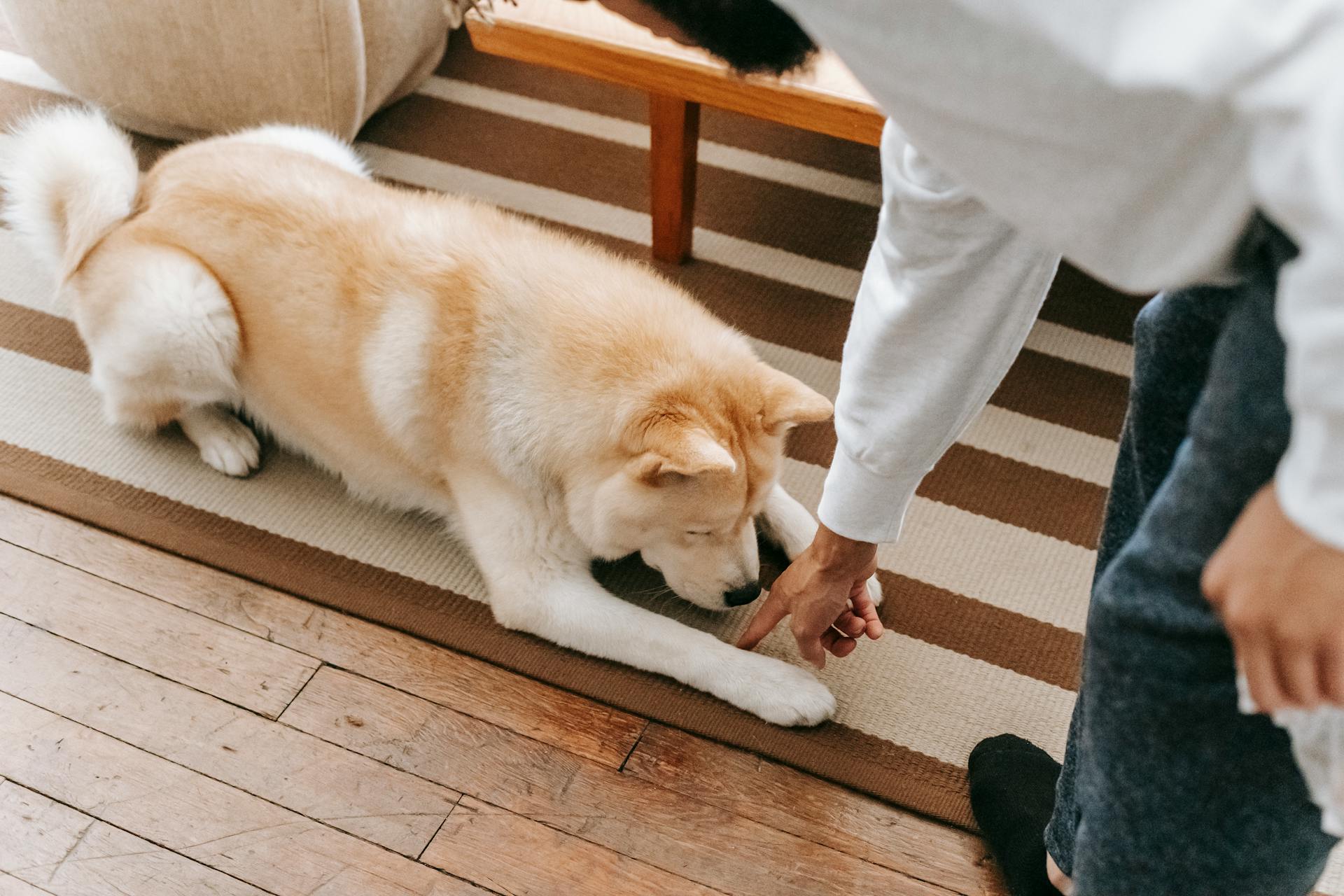
Regular check-ups with your veterinarian can help identify potential health issues early on. They can also provide guidance on managing conditions like hip dysplasia and bloat.
Here are some common health problems that Akitas can be prone to:
- Hip dysplasia
- Bloat
- Progressive retinal atrophy
- Von Willebrand's Disease
- Progressive retinal atrophy symptoms: bumping into walls, dilated pupils, and gray-colored eyes
By being aware of these potential health issues, you can take proactive steps to ensure your Akita lives a happy and healthy life. Regular exercise, a balanced diet, and plenty of love and attention can go a long way in maintaining your dog's overall well-being.
Breed Maintenance
The Akita Inu is a big dog that needs regular exercise to stay happy and healthy. They'll love going on outdoor activities like running or hiking with you.
Akitas are built for cold weather and can survive in a small home, but they'll appreciate a spacious backyard to stretch their legs.
Shedding is a significant aspect of Akita Inu maintenance, as they shed heavily twice a year, lasting from 2 to 4 weeks. You'll need to be prepared to clean and vacuum your house more frequently during this time.
Brushing their coat weekly is sufficient outside of shedding season, but be prepared to vacuum frequently during the heavy shedding periods. Their double-coated fur makes them suitable pets for cold climates.
Their lifespan is around 10-12 years, which is a significant commitment to caring for an Akita Inu. Regular nail trimming, about once a month, is also essential to prevent overgrowth.
Akitas are relatively low-maintenance when it comes to bathing, as they're good at keeping themselves clean. However, it's essential to brush their teeth multiple times a week and clean their ears regularly.
Their eyes are prone to problems, so pay extra attention to keeping them clean and healthy.
Care and Diet
An Akita eats a lot of food, about three cups a day, so choose a high-quality, nutrient-rich dog food that's full of animal proteins.
Feeding your Akita requires some research to avoid harmful ingredients like fillers and E numbers.
You should be aware that Akitas are protective of their food, so give them some alone time after you've dished it up.
Check this out: Best Shiba Inu Food
Try to avoid giving your Akita scraps from your plates, as food tailored to dogs is always preferable.
If you can afford it, favor dog food brands that are transparent about how they source their ingredients and what goes into each packet.
You can find suitable recipes and age-specific food recommendations in our guide to the best dog food for large dogs.
Temperament and Training
Akitas are wonderful, friendly dogs, but they can be a bit cold and defensive around other dogs. They require early socialization to help them mix with other dogs and to aid with training.
Akitas are determined and stubborn, making training harder than with other breeds. They need a dominant owner and a firm hand to thrive.
They are fast learners but can be very stubborn, so they should be owned by a patient owner willing to work with his dog. If learned properly, they will take basic commands from all family members.
Recommended read: Shiba Inu Hard to Train
Temperament and Training
Akitas are wonderful, friendly dogs, but they can be a bit cold and defensive around other dogs, so early socialization is crucial.
They're determined and stubborn, which makes training a bit harder than with other breeds. Experts don't recommend an Akita for a first-time pet parent.
Akitas have a high prey drive, so they'll perceive animals like birds and cats as potential prey. They're not suitable for homes with small children, as their reaction may be unpredictable.
Akitas are intelligent dogs, but they can be stubborn and strong-willed. Consistent and firm training from an early age is necessary to ensure they become well-mannered companions.
They're natural guardians with a strong protective instinct and can be territorial. Proper socialization and training can help manage their protective tendencies.
Male Akitas are very dominant, so they're not the right dog for beginners. Female Akitas are much calmer and easier to work with.
Akitas require a dominant owner and a firm hand. If you don't manage to impose your domination, you may have serious behavior problems with your dog.
They're fast learners, but can be very stubborn. A patient owner willing to work with their dog is essential for their success.
Akitas need constant mental and psychic activity. They love long walks, but skipping them sometimes won't cause any problems.
Explore further: Japanese Akita Pics
Dogs and Kids
Akita Inu dogs are best suited for homes with older kids who will know to properly play with the dog.
In the USA, Akitas rank seventh among all dog breeds that most often bite children, highlighting the importance of teaching kids how to play with the dog safely.
Always supervise play between Akita dogs and small children because the dog can unintentionally hurt the child while playing.
Getting an Akita dog requires a significant investment, with prices around $4,500, and even experienced owners may need to sign the dog up for professional training.
Intriguing read: Are Akitas Good with Kids
Similar Breeds and Characteristics
The Akita Inu is a unique breed, but it does share some similarities with other dogs. One of these breeds is the Shiba Inu, which is also a Japanese breed known for its loyalty and protective nature.
The Shiba Inu is not the only breed that bears a resemblance to the Akita Inu. Other similar breeds include the Japanese Spitz and the Hokkaido, which are all known for their thick coats and robust builds.
The Japanese Spitz and the Hokkaido are both medium-sized breeds that are well-suited for cold climates, much like the Akita Inu.
A unique perspective: Hokkaido Dog Breeders
Similar Breeds
If you're looking for breeds that share similarities with the Akita, you might be interested to know that the Shiba Inu is a breed that bears a resemblance in various ways to the Akita.
The Shiba Inu is a small to medium-sized dog with a fox-like appearance, similar to the Akita's distinctive features.
The Japanese Spitz is another breed that shares some physical characteristics with the Akita, including a thick double coat and a fluffy appearance.
Japanese Spitz dogs are known for their gentle and affectionate nature, which is similar to the loyal and loving personality of the Akita.
The Samoyed is a large, fluffy breed that shares some similarities with the Akita in terms of its thick coat and friendly demeanor.
Samoyed dogs are highly social and love to be around people, which is similar to the Akita's loyal and loving nature.
You might like: Shiba Inu Coat
Characteristics
The Akita breed is known for its bold and independent nature, making it a unique companion for the right owner. They are large and powerful dogs, with a striking coat color and distinctive curled tail.
Akita males can be quite dominant, so it's essential to consider this when deciding to bring one home. Females, on the other hand, are generally calmer and easier to work with.
One of the most notable characteristics of the Akita is its loyalty and protectiveness towards its family. They will go to great lengths to defend and care for their loved ones.
Akitas are not the right breed for beginners, as they require constant training and socialization from an early age. If they're not properly socialized, they may develop aggression towards other dogs and animals.
In terms of health, Akitas can live for around 10-12 years, with annual vet bills ranging from $1,000 to $3,000. A pet insurance plan can help cover some of these costs.
Akitas are known for their dignified and quick nature, with a striking coat color and exotic look. They are also highly intelligent and docile, making them a great companion for the right owner.
Their independent nature can sometimes give the impression of aloofness, especially around strangers. However, once you've earned their trust, they will be fiercely loyal and protective of you.
Frequently Asked Questions
Why is Akita Inu so expensive?
Akitas are expensive due to their limited availability and potential health issues. Learn more about the costs and challenges of owning an Akita Inu.
Is Akita Inu a guard dog?
Yes, Akita Inu is a natural guard dog due to its loyal and protective nature. They make excellent watchdogs, alerting owners to potential threats.
Are Akita dogs safe?
Akitas are generally safe family pets when properly trained and socialized, but their strong prey drive and protective instincts require careful consideration and attention to ensure a harmonious household. With the right care and handling, Akitas can be loving and loyal companions.
How much does a Japanese Akita cost?
A Japanese Akita can cost between $1,000 to $3,000, with prices on the higher end due to their rarity.
What were Japanese Akitas bred for?
Japanese Akitas were originally bred for hunting and fighting, but their versatility has led to their use in police and guard work.
Featured Images: pexels.com
